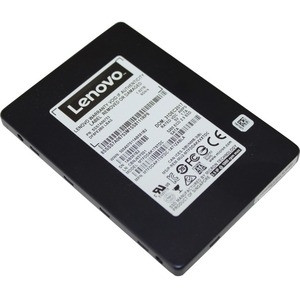Lenovo 2.5In 5200 960Gb En Sata Ssd (4Xb7A10154)
Features
The 5200 Enterprise Entry SATA SSDs have the following features:
- Industry standard 2.5-inch or 3.5-inch form factors
- 64-layer 3D TLC NAND flash memory
- Suitable for read-intensive workloads with an endurance of between 0.6 and 1.1 drive writes per day (DWPD) for 5 years
- 6 Gbps SATA host interface
- High reliability and enhanced ruggedness
- Absence of moving parts to reduce potential failure points in the server
- S.M.A.R.T. support
- Advanced Encrypting Standard (AES) 256-bit encryption
SSDs have a huge but finite number of program/erase (P/E) cycles, which affect how long they can perform write operations and thus their life expectancy. Enterprise Entry SSDs typically have a better cost per read IOPS ratio but lower endurance and performance compared to Enterprise Performance SSDs. SSD write endurance is typically measured by the number of program/erase cycles that the drive can incur over its lifetime, which is listed as total bytes written (TBW) in the device specification.
The TBW value that is assigned to a solid-state device is the total bytes of written data that a drive can be guaranteed to complete. Reaching this limit does not cause the drive to immediately fail; the TBW simply denotes the maximum number of writes that can be guaranteed. A solid-state device does not fail upon reaching the specified TBW. However, at some point after surpassing the TBW value (and based on manufacturing variance margins), the drive reaches the end-of-life point, at which time the drive goes into read-only mode. Because of such behavior, careful planning must be done to use SSDs in the application environments to ensure that the TBW of the drive is not exceeded before the required life expectancy.
For example, the 5200 Entry 3.8 4TB drive has an endurance of 7,700 TB of total bytes written (TBW). This means that for full operation over five years, write workload must be limited to no more than 4,219 GB of writes per day, which is equivalent to 1.1 full drive writes per day (DWPD). For the device to last three years, the drive write workload must be limited to no more than 7,032 GB of writes per day, which is equivalent to 1.8 full drive writes per day.


